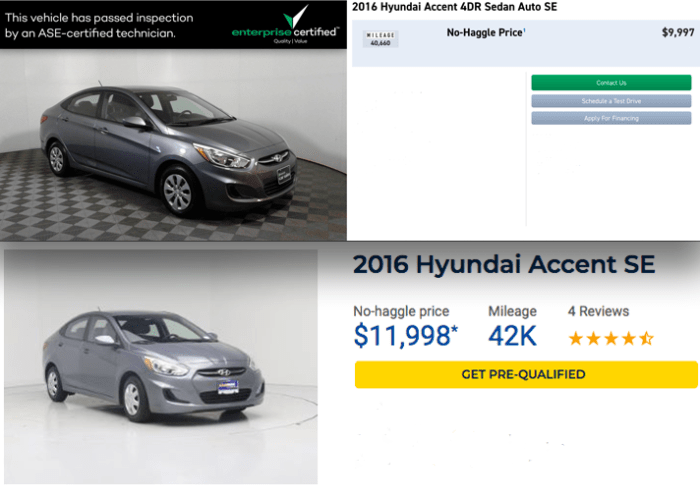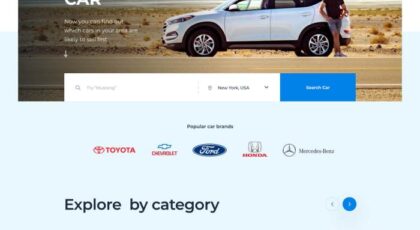Does enterprise sale cars - Does Enterprise sell cars? The answer is a resounding yes, but the intricacies of Enterprise's vehicle sales extend far beyond a simple affirmation. This analysis delves into the multifaceted world of Enterprise's used car market, exploring its various sales models—from fleet sales and lease returns to auctions—and examining the unique characteristics of each. We will dissect the vehicle assessment process, financing options, warranty provisions, and legal considerations involved, ultimately comparing the Enterprise experience to that of traditional dealerships and projecting future trends within this dynamic sector.
This in-depth exploration will illuminate the complexities of purchasing a used vehicle from Enterprise, providing a clear understanding of the process, potential benefits, and inherent considerations for prospective buyers. We will analyze buyer profiles across different sales channels, comparing pricing strategies and the overall volume of vehicles sold through each method. A detailed examination of vehicle condition, inspection processes, and common issues will also be presented, ensuring a comprehensive understanding of what to expect when buying from Enterprise.
Understanding Enterprise Car Sales

Source: consumerguide.com
Navigating the world of enterprise car sales can feel like entering a different universe compared to the traditional dealership experience. However, understanding the nuances of this market can unlock significant savings and potentially better deals on used vehicles. This guide will delve into the various aspects of enterprise car sales, providing a comprehensive overview to empower you as a savvy buyer.
Types of Enterprise Car Sales
Enterprise car sales encompass a variety of models, each with its own unique characteristics. Understanding these differences is crucial for making informed purchasing decisions.
| Model | Buyer Profile | Pricing Strategy | Volume |
|---|---|---|---|
| Fleet Sales | Businesses, government agencies, rental companies seeking large quantities of vehicles. | Bulk discounts, negotiated pricing based on volume. | High |
| Lease Returns | Individuals and businesses looking for slightly used vehicles at competitive prices. | Competitive pricing based on condition and residual value. | Medium to High |
| Auctions | Dealers, wholesalers, and individual buyers seeking potential bargains. | Competitive bidding, prices vary widely based on demand and condition. | High |
Enterprise Vehicle Condition and Assessment
The condition of vehicles sold through enterprise channels varies greatly depending on the model and prior use. A robust inspection and certification process is key to ensuring quality and mitigating risks for buyers.
Vehicles from lease returns typically exhibit lower mileage and better overall condition compared to those from fleet sales or auctions. However, even lease returns may have minor cosmetic imperfections or require minor repairs.
Enterprise businesses typically conduct thorough inspections, often involving multi-point checks, mechanical assessments, and documentation of any existing damage. Certified pre-owned programs offer additional assurance.
- Common issues include minor dents and scratches, wear and tear on interior components, and potential mechanical problems requiring repairs.
- Factors impacting vehicle value include mileage, age, make and model, condition, and any existing damage.
The Enterprise Sales Process
Purchasing a vehicle from an enterprise often differs significantly from a traditional dealership experience. The process tends to be more streamlined, with a focus on efficiency and transparency.
The process typically involves online browsing, scheduling an inspection (if desired), negotiating the price, completing the paperwork, and finalizing the purchase. Documentation typically includes the vehicle's history report, title, and any applicable warranties.
Unlike traditional dealerships, haggling over price might be less prevalent, particularly in auction settings or bulk fleet sales. However, negotiation is still possible, especially with lease returns.
Financing and Warranties
Financing options for enterprise vehicle purchases are comparable to those offered by traditional dealerships, with various lenders and loan terms available. Warranties vary widely depending on the enterprise and the specific vehicle's history.
While Enterprise primarily focuses on rentals, they do offer a selection of used vehicles for sale. If you're looking for a broader range of options, however, you might consider exploring other avenues, such as using a resource like
| Financing Option | Interest Rate | Loan Term | Warranty Type |
|---|---|---|---|
| Bank Loan | Variable, depending on credit score | 36-72 months | Manufacturer's warranty (if applicable), third-party warranty |
| Credit Union Loan | Potentially lower rates than banks | 36-84 months | Manufacturer's warranty (if applicable), third-party warranty |
| Enterprise Financing | Rates vary by enterprise | Variable | May include limited warranty |
Legal and Regulatory Aspects
The legal framework governing enterprise vehicle sales is similar to that for traditional dealerships. Key aspects include disclosure obligations, title transfer, and adherence to consumer protection laws.
- Enterprises must disclose any known defects or issues with the vehicle.
- Accurate odometer readings and clear title documentation are essential.
- State-specific regulations regarding used vehicle sales must be followed.
Comparison to Traditional Dealerships, Does enterprise sale cars
Enterprise car sales offer a stark contrast to the traditional dealership experience. While dealerships often focus on a personalized sales approach with extended warranties and add-ons, enterprise sales prioritize efficiency and value.
| Feature | Enterprise Sales | Traditional Dealership |
|---|---|---|
| Pricing | Generally lower, less negotiation | Higher, more negotiation potential |
| Selection | Wider variety, but less curated | More curated selection, specific models |
| Customer Service | Less personalized, more transactional | More personalized, higher service focus |
Market Trends and Future Outlook

Source: logodix.com
The enterprise vehicle sales market is dynamic, influenced by economic conditions, technological advancements, and evolving consumer preferences. The rise of online marketplaces and digital tools is reshaping the buying experience.
Increased transparency and data-driven decision-making are anticipated. Technological innovations, such as AI-powered vehicle inspections and automated valuation tools, are likely to enhance efficiency and accuracy. Consumers are increasingly seeking sustainable and technologically advanced vehicles, impacting the demand for certain models within the enterprise market.
A potential future scenario involves a more seamless integration of online and offline channels, with AI-driven tools assisting buyers in assessing vehicle condition and pricing. The emphasis on transparency and data-driven decision-making will continue to grow, further empowering buyers and streamlining the entire process.
Last Word
In conclusion, while Enterprise's used car sales represent a significant market segment, understanding the nuances of their various sales channels, vehicle condition assessment, and legal frameworks is crucial for prospective buyers. The comparison to traditional dealerships highlights key differences in pricing, selection, and customer service, allowing consumers to make informed decisions based on their individual needs and preferences. The future of Enterprise's vehicle sales is intrinsically linked to evolving technological advancements and shifting consumer demands, presenting both challenges and opportunities for the company in the years to come.
This analysis provides a foundational understanding to navigate this complex landscape effectively.
General Inquiries: Does Enterprise Sale Cars
What types of vehicles does Enterprise typically sell?
Enterprise primarily sells used vehicles, including cars, SUVs, and trucks, that are typically lease returns or part of their rental fleet.
Are Enterprise vehicles thoroughly inspected before sale?
Yes, Enterprise vehicles undergo a multi-point inspection process to assess their condition and identify any potential issues before being offered for sale. The extent of this inspection may vary depending on the sales channel.
What warranties are offered on Enterprise vehicles?
Warranty offerings vary depending on the vehicle and sales channel. Some vehicles may come with a limited warranty provided by Enterprise, while others may be sold "as is." It's crucial to clarify warranty details before purchase.
Can I negotiate the price of an Enterprise vehicle?
While Enterprise's pricing is often fixed, some negotiation may be possible, particularly for bulk purchases or in cases where the vehicle has specific defects.
What is the return policy for Enterprise vehicles?
Enterprise's return policy varies significantly from traditional dealerships. There is generally no return policy for vehicles sold "as is." Thorough inspection and understanding of the vehicle's condition prior to purchase are critical.



